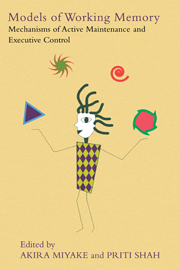Book contents
- Frontmatter
- Contents
- List of Contributors
- Dedication
- Preface
- Ode on Working Memory
- Acknowledgments
- 1 Models of Working Memory: An Introduction
- 2 Working Memory: The Multiple-Component Model
- 3 An Embedded-Processes Model of Working Memory
- 4 Individual Differences in Working Memory Capacity and What They Tell Us About Controlled Attention, General Fluid Intelligence, and Functions of the Prefrontal Cortex
- 5 Modeling Working Memory in a Unified Architecture: An ACT-R Perspective
- 6 Insights into Working Memory from the Perspective of the EPIC Architecture for Modeling Skilled Perceptual-Motor and Cognitive Human Performance
- 7 The Soar Cognitive Architecture and Human Working Memory
- 8 Long-Term Working Memory as an Alternative to Capacity Models of Working Memory in Everyday Skilled Performance
- 9 Interacting Cognitive Subsystems: Modeling Working Memory Phenomena Within a Multiprocessor Architecture
- 10 Working Memory in a Multilevel Hybrid Connectionist Control Architecture (CAP2)
- 11 A Biologically Based Computational Model of Working Memory
- 12 Models of Working Memory: Eight Questions and Some General Issues
- 13 Toward Unified Theories of Working Memory: Emerging General Consensus, Unresolved Theoretical Issues, and Future Research Directions
- Name Index
- Subject Index
3 - An Embedded-Processes Model of Working Memory
Published online by Cambridge University Press: 05 June 2012
- Frontmatter
- Contents
- List of Contributors
- Dedication
- Preface
- Ode on Working Memory
- Acknowledgments
- 1 Models of Working Memory: An Introduction
- 2 Working Memory: The Multiple-Component Model
- 3 An Embedded-Processes Model of Working Memory
- 4 Individual Differences in Working Memory Capacity and What They Tell Us About Controlled Attention, General Fluid Intelligence, and Functions of the Prefrontal Cortex
- 5 Modeling Working Memory in a Unified Architecture: An ACT-R Perspective
- 6 Insights into Working Memory from the Perspective of the EPIC Architecture for Modeling Skilled Perceptual-Motor and Cognitive Human Performance
- 7 The Soar Cognitive Architecture and Human Working Memory
- 8 Long-Term Working Memory as an Alternative to Capacity Models of Working Memory in Everyday Skilled Performance
- 9 Interacting Cognitive Subsystems: Modeling Working Memory Phenomena Within a Multiprocessor Architecture
- 10 Working Memory in a Multilevel Hybrid Connectionist Control Architecture (CAP2)
- 11 A Biologically Based Computational Model of Working Memory
- 12 Models of Working Memory: Eight Questions and Some General Issues
- 13 Toward Unified Theories of Working Memory: Emerging General Consensus, Unresolved Theoretical Issues, and Future Research Directions
- Name Index
- Subject Index
Summary
FIVE CENTRAL FEATURES OF THE APPROACH
The embedded-processes model of working memory relies upon the following five principles, which emphasize links between memory and attention.
(1) Working memory information comes from hierarchically arranged faculties comprising: (a) long-term memory, (b) the subset of longterm memory that is currently activated, and (c) the subset of activated memory that is in the focus of attention and awareness.
(2) Different processing limits apply to different faculties. The focus of attention is basically capacity limited, whereas activation is time limited. The various limits are especially important under nonoptimal conditions, such as interference between items with similar features.
(3) The focus of attention is controlled conjointly by voluntary processes (a central executive system) and involuntary processes (the attentional orienting system).
(4) Stimuli with physical features that have remained relatively unchanged over time and are of no key importance to the individual still activate some features in memory, but they do not elicit awareness (i.e., there is habituation of orienting).
(5) Awareness influences processing. In perception it increases the number of features encoded, and in memory it allows new episodic representations to be available for explicit recall.
Two prior integrative reviews of information processing, an article (Cowan, 1988) and a book (Cowan, 1995), describe a view that will serve as my basis for discussing working memory.
- Type
- Chapter
- Information
- Models of Working MemoryMechanisms of Active Maintenance and Executive Control, pp. 62 - 101Publisher: Cambridge University PressPrint publication year: 1999
- 621
- Cited by

